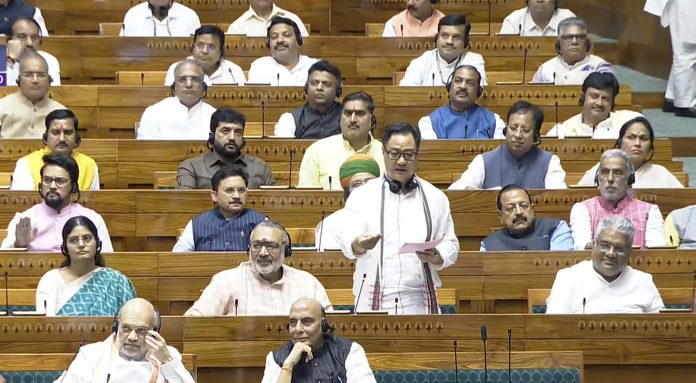New Delhi, Aug 8: Union Minority Affairs Minister Kiren Rijiju on Thursday introduced The Waqf (Amendment) Bill and proposed sending it to a joint parliamentary committee after opposition parties objected to its provision.
Follow The Daily Excelsior Channel On WhatsApp
He also introduced The Mussalman Wakf (Repeal) Bill, 2024.
Home Minister Amit Shah said since the Waqf Act of 1995 came into being, there was a need to repeal the Mussalman Wakf Act, 1923 which had lost its relevance.
He accused the opposition of “misleading” Muslims and saying that amendments had to be brought in as the present act had many mistakes and could not serve its purpose.
The Waqf (Amendment) Bill also aims at renaming the Waqf Act, 1995, as the Unified Waqf Management, Empowerment, Efficiency and Development Act, 1995.
The bill was circulated among Lok Sabha members on Tuesday night ahead of its introduction.
Soon after Rijiju sought leave to introduce the bill, many opposition MPs, who had given notices to oppose the bill, alleged that the proposed legislation was an “attack on the Constitution and federalism”.
Responding to the concerns flagged by opposition members, Rijiju said there will be no interference with freedom of any religious body in the Waqf bill.
He also asserted that no provision of the Constitution has been violated in the draft law.
He said that the Waqf Act 1995 did not serve its purpose and told Congress members that the proposed amendments seek to achieve what the Congress government couldn’t.
The minister told the House that a joint parliamentary committee had recommended that Waqf Act 1995 should be re-looked and said the opposition was opposing the measure for the sake of politics.
Rijiju said the opposition was trying to mislead people about intention of the Waqf bill. He said no law can be above Constitution but 1995 Waqf law has such provisions.
He claimed that many MPs have privately told him that Waqf boards have been captured by mafia.
He underlined that extensive consultations have taken place before the bill was drafted.
Rijiju claimed such MPS were opposing the bill due to party pressure.
According to its statement of objects and reasons, the bill seeks to omit Section 40 of the current law relating to the powers of the board to decide if a property is Waqf property.
It provides for a broad-based composition of the Central Waqf Council and the state Waqf boards and ensures the representation of Muslim women and non-Muslims in such bodies.
The bill also proposes the establishment of a separate board for the Boharas and Aghakhanis. The draft law provides for the representation of Shias, Sunnis, Bohras, Agakhanis and other backward classes among Muslim communities.
The bill also aims to clearly define “Waqf as Waqf by any person practising Islam for at least five years and having ownership of such property.”
One of its objectives is streamlining the manner of registration of Waqfs through a central portal and database. A detailed procedure is established for mutation as per revenue laws with due notice to all concerned before recording any property as a Waqf property.
The Wakf Act, 1995, was brought to regulate ‘Auqaf’ (assets donated and notified as Waqf) by a ‘wakif’ (the person who dedicates a property for any purpose recognised by Muslim law as religious or charitable).
The Act was last amended in 2013. (Agencies)


